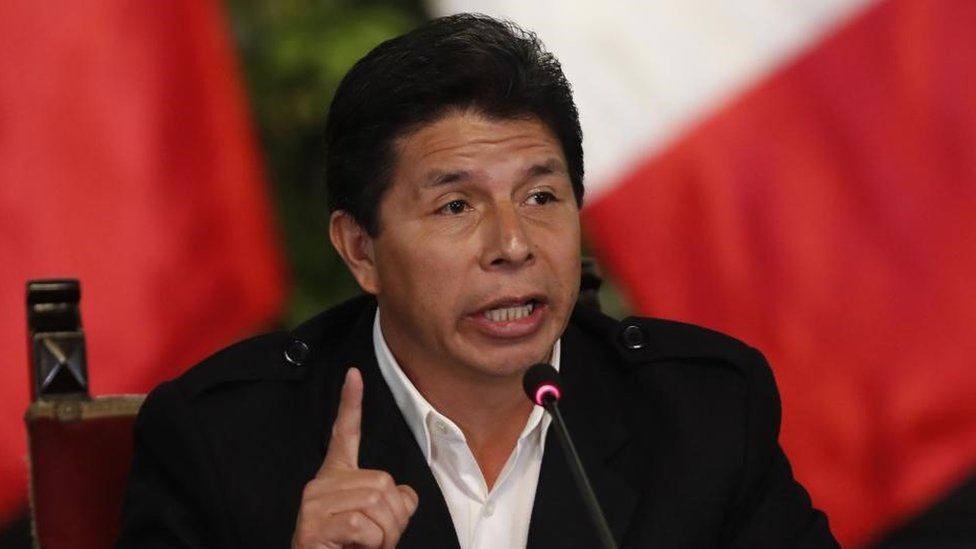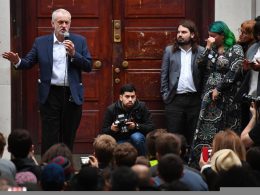By Mauro Espinola, Alternativa Socialista (our sister organisation in Mexico)
Yesterday, the president of Peru, Pedro Castillo, was removed from office after attempting to dissolve Congress and decreeing a government of exception. In this way, the Peruvian oligarchy, using Castillo’s parliamentary maneuvers as an excuse, is once again trying to derail the government elected by millions of Peruvian workers and campesinos.
Deep political crisis
The parliamentary coup against Castillo has taken place after months of attempts by the right wing and the Peruvian oligarchy to remove Pedro Castillo from office, accusing him of corruption, which resulted in Castillo’s cabinet becoming a revolving door through which three complete cabinets passed. This in itself, demonstrates the deep political crisis Peru is going through as a consequence of the pressures of the right-wing and the oligarchy on Castillo’s government.
The parliamentary coup against Castillo has taken place after months of attempts by the right wing and the Peruvian oligarchy to remove the former teacher and trade unionist from office. They accused him of corruption, which resulted in Castillo’s administration becoming a revolving door through which three complete cabinets passed in the last months. This in itself, demonstrates the deep political crisis Peru is going through as a consequence of the pressures of the right-wing and the oligarchy on Castillo’s government.
Right-wing exploit economic turmoil
Back in March, as a consequence of the war in Ukraine and the crisis it has brought with it worldwide, hundreds of workers mobilized in Peru against inflation and the crisis in the absence of consistent government policies despite Castillo’s campaign promises with his slogan “no more poor people in a rich country”.
It was clear then that the Peruvian oligarchy was regaining its initiative, after its electoral defeat, with the intention of using this crisis to overthrow the Castillo government, with a view to limiting possible reforms for the benefit of the Peruvian working masses, and above all, fearing that the masses would push for changes more profound than those proposed by Castillo’s timid institutional agenda.
Since the beginning of Castillo’s government, the oligarchy has not concealed its coup efforts. On the contrary, even before Castillo was sworn in, the oligarchy and the Peruvian capitalists threatened to prevent him from taking power. Only the fear that the mobilizations of support would get out of hand persuaded the right wing to follow this path. But what, then, has changed?
The new offensive of the Peruvian oligarchy, which has succeeded in ousting Castillo from the presidency of Peru, can only be explained by the mistakes and moderation committed by Castillo himself since the beginning of his term of office. The clearest example of this was his declarations, once elected, that he was not going to promote expropriations of land or any company, even though this was one of his campaign promises.
Failures of reformism in the Age of Disorder
In addition, the toll of the pandemic and the economic crisis has meant that millions of Peruvians view Castillo with growing scepticism. Castillo’s weakness, which has motivated the right-wing offensive, has been his policy of managing Peruvian oligarchic capitalism and the demobilization and disorganization of his support base.
Castillo renounced the leftist program on which he was elected. As a result, he lost popular support and could not offer a way out of the crisis that would satisfy the interests of the working class and other oppressed sectors of Peruvian society. The right-wing in Congress and the ruling class have taken advantage of this. Rebuilding a socialist left based on the struggles of the working class and oppressed, with a socialist program that learns from Castillo’s mistakes, is the central task ahead.
Socialists and revolutionaries oppose the coup against Castillo, for we understand that this will bring only more tragedies to the working class and poor of Peru. We do not recognize the corrupt congress as having the authority to judge Castillo and we demand his freedom. This in no way means a defense of Castillo’s program or methods, but on the contrary a recognition of the need to build a revolutionary alternative for the campesinos and workers that advances a program of socialist struggle for Peru.












